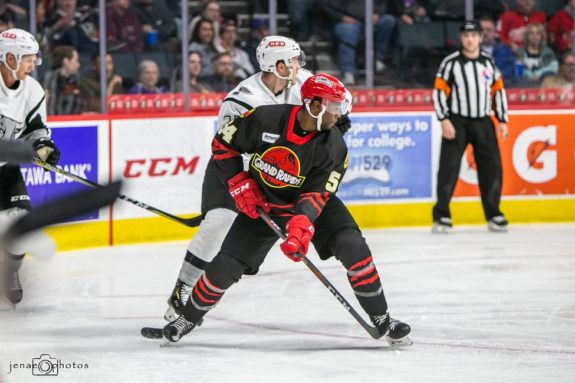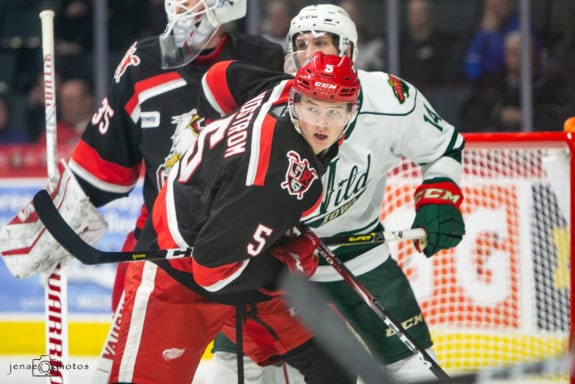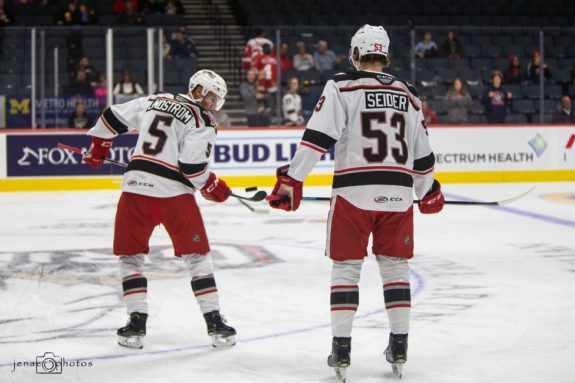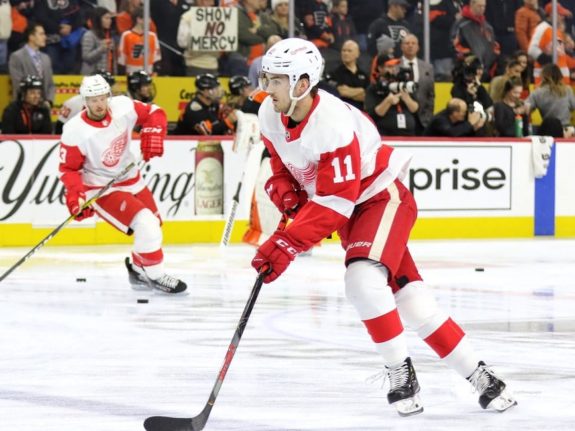What’s The Grind Line? Apart from the once-famous line of Kris Draper, Kirk Maltby, and either Joe Kocur or Darren McCarty, The Grind Line is also The Hockey Writers’ weekly column about the Detroit Red Wings. Rachel Anderson, Devin Little, and Tim Neral are the muckers who make up THW’s forechecking unit and sound off on Red Wings topics.
The frequent call-ups by the Detroit Red Wings have found many prospects taking multiple trips – sometimes within the same day. The team has been hit hard with injuries and staggering performance resulting in their need to call in support. More than 39 times this season, Detroit has had to call up a skater, either on paper or in person, to accommodate the ailing team.

Givani Smith, Filip Zadina, Dennis Cholowski and Gustav Lindstrom have racked up the frequent flyer miles. Through the call-ups, however, the Red Wings have been able to get a live progress report on their developing skaters. Each player’s unique set of abilities fills a specific role, but is it enough to get the full-time spot?
Related: Marcel Pronovost – Red Wings’ Underrated Star
The lineup in Detroit will look very different next season, but which youngsters will crack the roster? This week, The Grind Line will take a look at the future Wings who have made the trek and who have so far, earned their place in the 2020-21 lineup.
Rachel Anderson – Gustav Lindstrom
Coming out of the SHL and making a strong first impression in the AHL with Grand Rapids, Lindstrom has shown a maturity beyond his years. His already high understanding of the game and his position helped the Griffins when he was on the AHL roster, and he made a strong case for his call up in Detroit.
Related: Taro Hirose on Clear Development Path
When he was called up, it was speculated that his contract was not a standard entry-level deal and didn’t hold the nine-game NHL rule like most. That being said, the plan for Lindstrom all along appears to have been a quick stop in the AHL to adjust before heading up to the big club. The NHL is quicker paced, but he’s averaging 16 minutes on the ice each night, is keeping up just fine, and is getting plenty of ice to get started.

Long term, Lindstrom will be a strong positional defenseman. His net-front game has improved since the start of the season and he’s adapting to physicality more. That will enable him to not only be a strong body to defend the goaltender but get the edge against the opposition. He’s got a calm demeanor that should bring confidence to the team in the coming seasons – where they desperately need it. His disposition alone is a huge asset to the team. He is calm and in control which has already enabled him to battle through some rough shifts without losing his focus.
He’s learning to take more shots as well – averaging almost one per game at least. He’s not an offensive powerhouse of a defenseman, but he is actively seeking to understand it and execute what he’s learned.
Tim Neral – Dennis Cholowski & Gustav Lindstrom
Most advanced hockey statistics hold team performance in some regard and it’s very taxing to produce strong Corsi or Fenwick scores when your unit is the victim of regular blitzkrieg. Yet I still appreciate the production of defensemen Lindstrom and Cholowski. Cholowski’s power-play command is high quality while Lindstrom has, despite logic, managed a shots-for percentage (SF%) of 49.71 while on the NHL’s worst team.

If you’re into the advanced hockey statistics, it’s worth learning about Corsi For Percentage Quality of Competition (CF% QoC). While there’s no such thing as a perfect stat, CF% QoC provides an avenue through which to measure performance within the given club.
When you look at Lindstrom’s Corsi For Percentage (CF%, measures shots taken while on ice compared to your opponent, with 50 being the baseline), it’s pretty terrible: 42.86%, per Corsica Hockey. Look through the frame of CF% QoC, however, and that number jumps to 48.86%, a full six-point increase and nearly at the league average. The same could be said of Cholowski’s measurables (46.5 CF% vs. 49.73 CF% QoC). It’s hard to rate Cholowski and Lindstrom’s ceilings but where there are gold nuggets, there’s often gold.
Devin Little – Filip Zadina
It’s no secret that the Red Wings have struggled to produce offense throughout the entire 2019-20 season. It’s no wonder that fans are getting excited about the possibility of adding a dynamic offensive prospect like Alexis Lafreniere to the organization.

And yet, in the 28 games that Filip Zadina has played in this season, he has displayed constant growth while adapting to the NHL level. With 15 points, Zadina has one of the best points-per-game rates on the team.
Given the opportunity to play with the Red Wings from the start next season, Zadina should continue to develop into the player the team envisioned when they selected him sixth overall in 2018.